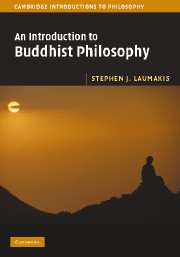Part II - Details of the Dhamma
Published online by Cambridge University Press: 05 June 2012
Summary
The word dhamma/dharma, whose root “dhr” means “to bind,” “to keep,” or “to maintain,” refers to a rather broad range of entities and relations. In fact, it seems to have the broadest field of semantic reference of any word in Pali (dhamma) or Sanskrit (dharma). On the one hand, dhamma is used to refer to both objects and their parts or elements (i.e., physical objects in the world around us). It also may refer to relations among objects, or more generally to any object of reference in thought or speech – in the same way that “thing” is used in ordinary English. On the other hand, dhamma may be understood to include “social morality” or the “moral law” as that which holds or binds people together. In this sense, dhamma refers to the underlying pattern or order of the cosmos and also to the pattern and order realized in the social and ethical rules and laws of human beings. Understood in this way, dhamma includes the ideas of virtue, duty, or proper moral and ethical conduct. Finally, as a technical term, Dhamma also means the specific teachings of the Buddha. As such, Buddhism is concerned with experiencing, discovering, understanding, practicing, and realizing the Dhamma.
Chapters 5 through 8 consider the basic teachings of the Buddha in more detail as well as their historical developments. Chapter 5 begins with two stories relating to the scope of the Buddha's teachings as well as his general attitude toward philosophical views.
- Type
- Chapter
- Information
- An Introduction to Buddhist Philosophy , pp. 81 - 82Publisher: Cambridge University PressPrint publication year: 2008



